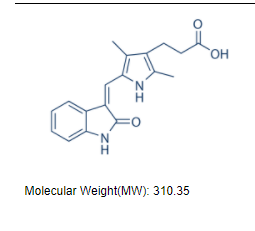Products
Orantinib 252916-29-3
| 1.Inquiries will be replied within 24 hours |
| 2.We could supply various packages as you required |
| 3.To protect the profit of our agents, price will not show on website, please send inquiries to get the price. |
| 4.Fast delivery, goods arrive your office within 3 to 5 days |
| 5.Please click "Inquiry" or "Email" below to get the price |
 |
|
|
||||||
|
C18H18N2O3 |
|
|||||
|
310.35 |
|
in stock | ||||
|
252916-29-3 |
|
98%+ |
Introduction
TSU-68 is a competitive inhibitor, with regard to ATP, to Flk-1/KDR trans-phosphorylation, FGFR1 trans-phosphorylation, and PDGFRβ kinases autophosphorylation. TSU-68 (0.03-10 μM) inhibits tyrosine phosphorylation of KDR in VEGF stimulated HUVECs. TSU-68 also inhibits PDGF-stimulated PDGFRβ tyrosine phosphorylation in NIH-3T3 cells overexpressing PDGFRβ at a minimum concentration of 0.03-0.1 μM. TSU-68 inhibits acidic FGF-induced phosphorylation of the FGFR1 substrate 2 at 10 μM and higher. However, TSU-68 (up to 100 μM) has no effect on EGF-stimulated EGFR tyrosine phosphorylation in NIH-3T3 cells overexpressing EGFR. TSU-68 inhibits VEGF-driven and FGF-driven mitogenesis of HUVECs with mean IC50 of 0.34 μM and 9.6 μM, respectively. In human myeloid leukemia MO7E cells, TSU-68 inhibits the tyrosine autophosphorylation of stem cell factor (SCF) receptor, c-kit, with IC50 of 0.1-1 μM, as well as ERK1/2 phosphorylation, a signaling event downstream of c-kit activation. TSU-68 also inhibits SCF-induced proliferation of MO7E cells with IC50 of 0.29 μM, and induces apoptosis.
TSU-68 (75-200 mg/kg) induces tumor growth inhibition against a broad range of tumor types in xenograft models in athymic mice, including A375, Colo205, H460, Calu-6, C6, SF763T, and SKOV3TP5 cells. TSU-68 (75 mg/kg) also suppresses tumor angiogenesis of C6 glioma xenografts. In a tumor model of HT29 human colon carcinoma, TSU-68 (200 mg/kg) decreases the average vessel permeability and average fractional plasma volume in the tumor rim and core. TSU-68 promotes abnormal stromal development at the periphery of carcinomas. In a rabbit VX2 liver tumor model, TSU-68 (200 mg/kg) augments the effect of chemotherapeutic infusion.
TSU-68 (75-200 mg/kg) induces tumor growth inhibition against a broad range of tumor types in xenograft models in athymic mice, including A375, Colo205, H460, Calu-6, C6, SF763T, and SKOV3TP5 cells. TSU-68 (75 mg/kg) also suppresses tumor angiogenesis of C6 glioma xenografts. In a tumor model of HT29 human colon carcinoma, TSU-68 (200 mg/kg) decreases the average vessel permeability and average fractional plasma volume in the tumor rim and core. TSU-68 promotes abnormal stromal development at the periphery of carcinomas. In a rabbit VX2 liver tumor model, TSU-68 (200 mg/kg) augments the effect of chemotherapeutic infusion.
Products for scientific research use only






